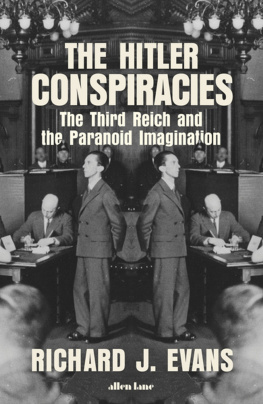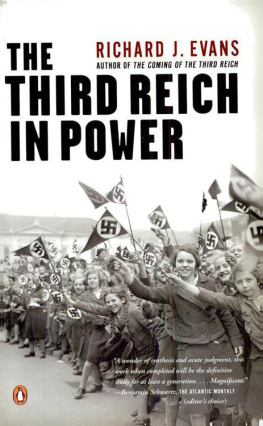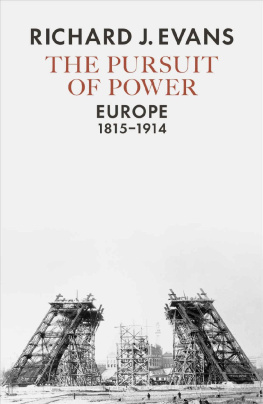Table of Contents
Praise for The Third Reich in Power
Heir to a British tradition of dons who write engagingly for a broad public, Evans has done a great service simply in digesting the mountain of recent scholarship on the Nazis for the general reader.
The New York Times Book Review
A wonder of synthesis and acute judgment, this work when completed will be the definitive study for at least a generation... [A] magnificent achievement... When his game is on, as it usually is, few can rival his ability to write crisply argued history. Evanss coolly precise, profoundly disquieting history gives the most thorough answer yet to the question that will nag humanity for a thousand years: What accounts for the German peoples supportat times passive, at times ferventfor the vicious and often ridiculous thugs who ruled over them for nearly twelve years?
Benjamin Schwartz, The Atlantic Monthly (editors choice)
Evans new book is a masterly and exhaustive account... a most impressive study.
Foreign Affairs
There seems to be nothing Mr. Evans does not cover. What sets [his trilogy] apart ... is the narrative command Mr. Evans exercises over the innumerable components of the history and the breadth and depth of his synthesis.
The Washington Times
Evans masterly account blends narrative with the discussion of important themes.... Brilliantly told.
The Globe and Mail (Toronto)
Mr. Evans latest book has been lauded as a definitive, authoritative English-language account, blending narrative, description, and analysis.
Embassy
A work drawn from a mountain of scholarship... As a readable, compelling synthesis of the period, [The Third Reich in Power]... is a major achievement.
The Boston Globe
A major achievement. No other recent synthetic history has quite the range and narrative power of Evanss work.... When complete, Evanss trilogy will take its place alongside Ian Kershaws monumental two-volume biography of Hitler as the standard works in English.
Publishers Weekly (starred review)
A superb account of the growth and day-to-day functioning of the Nazi state.
Kirkus Reviews (starred review)
ABOUT THE AUTHOR
Richard J. Evans is one of the worlds leading historians of modern Germany. He was born in London in 1947. From 1989 to 1998 he was Professor of History at Birkbeck College, University of London. Since 1998 he has been Professor of Modern History at Cambridge University. In 1994 he was awarded the Hamburg Medal for Art and Science for cultural services to the city, and in 2000 he was the principal expert witness in the David Irving libel trial. His books include The Feminist Movement in Germany, 1894-1933, Death in Hamburg (winner of the Wolfson Literary Award for History), In Hitlers Shadow, Rituals of Retribution (winner of the Fraenkel Prize in Contemporary History), In Defence of History (which has so far been translated into eight languages), Telling Lies About Hitler and The Coming of the Third Reich (shortlisted for the Los Angeles Times Book Prize).
For Matthew and Nicholas
ILLUSTRATION CREDITS
Copyright is held by the following sources.
AKG, London: pictures 3, 4, 9, 14, 35, 37; Bildarchiv Preussischer Kulturbesitz: pictures 13, 26, 34, 40, 41; Bundesarchiv, Koblenz: pictures 8, 15, 18, 23, 32; Corbis: pictures 2, 5, 7, 17, 19, 21, 36, 38, 39; Kunstverlag Peda: picture 10; Arno Breker by Marco-VG (Museum Arno Breker, Bonn): picture 11; Staatsarchiv, Munich: picture 28; The Weiner Library, London: picture 16.
Every effort has been made to trace copyright holders but this has not been possible in all cases. If notified, the publishers will be pleased to rectify any omissions at the earliest opportunity.
Preface
This book tells the story of the Third Reich, the regime created in Germany by Hitler and his National Socialists, from the moment when it completed its seizure of power in the summer of 1933 to the point when it plunged Europe into the Second World War at the beginning of September 1939. It follows an earlier volume, The Coming of the Third Reich, which told the story of the origins of Nazism, analysed the development of its ideas and recounted its rise to power during the years of the ill-fated Weimar Republic. A third volume, The Third Reich at War, will follow in due course, covering the period from September 1939 to May 1945 and exploring the legacy of Nazism in Europe and the world in the rest of the twentieth century and on to the present. The general approach of all three volumes is set out in the Preface to The Coming of the Third Reich and does not need to be repeated in detail here. Those who have already read that book can go straight to the beginning of the first chapter of this one; but some readers might like to be reminded of the central arguments of the earlier volume, and those who have not read it may wish to turn to the Prologue, which sketches the main lines of what happened before the end of June 1933, when the story told in the following pages begins.
The approach adopted in the present book is necessarily thematic, but within each chapter I have tried, as in the previous volume, to mix narrative, description and analysis and to chart the rapidly changing situation as it unfolded over time. The Third Reich was not a static or monolithic dictatorship; it was dynamic and fast-moving, consumed from the outset by visceral hatreds and ambitions. Dominating everything was the drive to war, a war that Hitler and the Nazis saw as leading to the German racial reordering of Central and Eastern Europe and the re-emergence of Germany as the dominant power on the European Continent and beyond that, the world. In each of the following chapters, dealing in turn with policing and repression, culture and propaganda, religion and education, the economy, society and everyday life, racial policy and antisemitism, and foreign policy, the overriding imperative of preparing Germany and its people for a major war emerges clearly as the common thread. But that imperative was neither rational in itself, nor followed in a coherent way. In one area after another, the contradictions and inner irrationalities of the regime emerge; the Nazis headlong rush to war contained the seeds of the Third Reichs eventual destruction. How and why this should be so is one of the major questions that run through this book and bind its separate parts together. So too do many further questions: about the extent to which the Third Reich won over the German people; the manner in which it worked; the degree to which Hitler, rather than broader systematic factors inherent in the structure of the Third Reich as a whole, drove policy onwards; the possibilities of opposition, resistance, dissent or even non-conformity to the dictates of National Socialism under a dictatorship that claimed the total allegiance of all its citizens; the nature of the Third Reichs relationship with modernity; the ways in which its policies in different areas resembled, or differed from, those pursued elsewhere in Europe and beyond during the 1930s; and much more besides. A narrative thread is provided by the arrangement of the chapters, which move progressively closer to the war as the book moves along.














